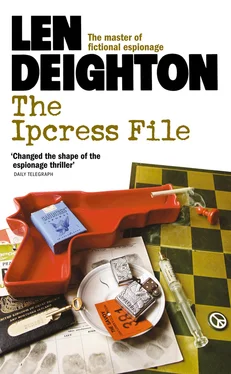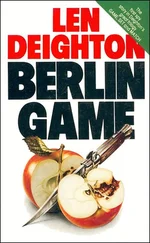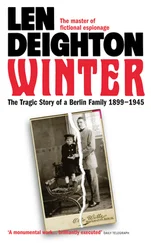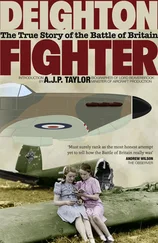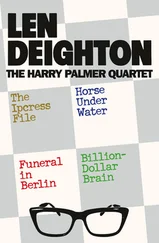Len Deighton - The Ipcress File
Здесь есть возможность читать онлайн «Len Deighton - The Ipcress File» — ознакомительный отрывок электронной книги совершенно бесплатно, а после прочтения отрывка купить полную версию. В некоторых случаях можно слушать аудио, скачать через торрент в формате fb2 и присутствует краткое содержание. Жанр: unrecognised, на английском языке. Описание произведения, (предисловие) а так же отзывы посетителей доступны на портале библиотеки ЛибКат.
- Название:The Ipcress File
- Автор:
- Жанр:
- Год:неизвестен
- ISBN:нет данных
- Рейтинг книги:3 / 5. Голосов: 1
-
Избранное:Добавить в избранное
- Отзывы:
-
Ваша оценка:
- 60
- 1
- 2
- 3
- 4
- 5
The Ipcress File: краткое содержание, описание и аннотация
Предлагаем к чтению аннотацию, описание, краткое содержание или предисловие (зависит от того, что написал сам автор книги «The Ipcress File»). Если вы не нашли необходимую информацию о книге — напишите в комментариях, мы постараемся отыскать её.
The Ipcress File — читать онлайн ознакомительный отрывок
Ниже представлен текст книги, разбитый по страницам. Система сохранения места последней прочитанной страницы, позволяет с удобством читать онлайн бесплатно книгу «The Ipcress File», без необходимости каждый раз заново искать на чём Вы остановились. Поставьте закладку, и сможете в любой момент перейти на страницу, на которой закончили чтение.
Интервал:
Закладка:
‘Yes,’ I said quickly
‘That’s all right then, sit down. I’m not doing no more coffee except with food.’ I nodded. ‘I take your order in a minute,’ he said.
I sat down and felt in my pocket for cigarettes. I had three and a half packets in one pocket and a quarter of a pound of garlic sausage, and a soft metal foil parcel of butter in the other. It was then that I discovered there a brand new hypodermic syringe in a black cardboard box, and I thought, ‘What did that cigarette-girl mean by “Go home. There is nothing to be gained here”?’
4
I used the emergency number to go through to our secret exchange: Ghost – which was our section of the special Government telephone exchange: Federal.
Ghost switchboard gave the usual eighty seconds of ‘Number unobtainable’ signal – to deter callers who dialled it by accident – then I gave the week’s code-words ‘MICHAEL’S BIRTHDAY’, and was connected to the duty officer. He plugged me in to Dalby who might have been anywhere – half-way across the world, perhaps. I conveyed the situation to him without going into details. He felt it was all his fault, and said how pleased he was that I hadn’t got mixed up with the ‘blue pointed head mob’. ‘You will be doing a job with me next week. It might be very tricky.’
‘Fine,’ I said.
‘I’ll speak to Alice about it, meanwhile I want you to change your papers.’ He rang off. I went home to a garlic sausage sandwich. ‘1,200,’ I thought. ‘That’s twenty-four pounds a week.’
‘Changing papers’ is a long and dreary process.
It meant photographs, documents, finger-prints and complications. A small roomful of civilian clerks at the War Office are busy the whole year through, doing nothing else. On Thursday I went to the little room at the top of the building to the department run by Mr Nevinson. On the door the small white ticket in its painted frame said, ‘Documents. Personnel Reclassifications and Personnel deceased’. Mr Nevinson and his colleagues have the highest security clearance of anyone in government employ and, as they all know very well, they are under continuous security surveillance. Through these hands at some time or other go papers for every important agent in HM Govt employ.
For example; take the time my picture appeared in The Burnley Daily Gazette in July 1939, when I won the fifth form mathematics prize; the following year the whole of the sixth appeared in a class photograph. If you try to see those issues now at the library, at the offices of The Burnley Daily Gazette , or at Colindale even, you’ll discover the thoroughness of Mr Nevinson. When your papers are changed your whole life is turned over like top-soil; new passport of course, but also new birth-certificate, radio and TV licences, marriage-certificates; and all the old ones are thoroughly destroyed. It takes four days. Today Mr Nevinson was starting on me.
‘Look at the camera, thank you. Sign here, thank you; and here, thank you; and again here, thank you; thumbs together, thank you; fingers together, thank you; now altogether, thank you; now you can wash your hands, thank you. We’ll be in touch. Soap and towel on the filing cabinet!’
5
[ Aquarius (Jan 20–Feb 19) Don’t make hasty decisions about a prospect you have in mind. A difference of opinion may provide a chance for a journey. ]
Monday I got to Charlotte Street usual time. A little grey rusting Morris 1000 knelt at the kerb, Alice at the controls. I was pretending I hadn’t seen her when she called out to me. I got into the car, the motor revved, away we went. We drove in silence a little way when I said, ‘I can’t find the bag of wet cement to put my feet into.’ She turned and cracked her make-up a little. Encouraged, I asked her where we were going.
‘To bait a Raven trap, I believe,’ she said.
There seemed no answer to that. After a few minutes she spoke again. ‘Look at this,’ she said, handing me a felt toy exactly like the one I had declined to buy in the strip club the week before. ‘There.’ She jabbed a finger while driving, talking and tuning the car radio. I looked at the pink spotted felt dog; some stuffing was coming out of its head. I prodded it around. ‘You’re looking for this?’ Alice had a Minox in her hand. She gave me a sour look, or perhaps I already had one.
‘I was pretty stupid …’ I said.
‘Try not to stay that way,’ she almost smiled. If she went on that way she’d soon have a crackle finish.
In Vauxhall Bridge Road we pulled into the kerb behind a black Rover car. Alice gave me a buff envelope about 10in by 6in and ¾in thick sealed with wax, and opened the door. I followed her. She ushered me into the rear seat of the Rover. The driver had a short haircut, white shirt, black tie and navy blue DB raincoat. Alice smacked the roof of the car with the flat of her hand; show jumper style. The car pulled away through the ‘back doubles’ of Victoria. I opened the buff envelope. Inside was a new passport, thumbed, bent and back-dated to look old; two keys; a sheet of paper with typing on it; three passport photos, and one of those multi-leaved airline tickets. I was booked BOAC first-class single LON/BEI. The typewritten sheet gave plane times and said, – ‘BA712. LAP 11.25. Beirut International Airport 20.00. Photo Identity: RAVEN. Juke box. Upstairs. BEI Airport. Destroy by burning immediately.’ It gave no date. Attached to one key was a number: ‘025.’ I looked at the man in the photos, then burned the typewritten sheets and the photos, and lit a cigarette.
We turned left out of Beauchamp Place on to the all too lavishly tended stretch of road that connects Maidenhead with Harrods. The driver’s first words were spoken at the Airport. ‘The overnight lockers are across the hall,’ he said.
I left the car and driver, and fitted my key into 025, one of a wall-full of metal twenty-four-hour lockers. It swung open and I left the key in the lock. Inside was a dark leather brief-case and a blue canvas zip bag with bulging side pockets. I took them across the hall to check in for my flight.
‘Is this all your baggage, sir?’ She weighed in my wardrobe case, took my ticket, straightened her strap, fluttered her eyelids and gave me a boarding card.
I took my brief-case, walked to the bookstall, bought New Statesman , Daily Worker and History Today , then took off towards my Exit. A bundle of people surged around kissing and greeting and ‘how lovelying’ their way across from the customs. In a dirty raincoat, hemmed in every-which-way was Ross. I didn’t want to see him, and it was mutual, but for a moment the crowd forced us together like unconnected elements among so many molecular constructions. I beamed at him – I knew this would irritate him most.
Through the big shed-like customs hall.
The BOAC girl called the flight in a resonant metallic voice – ‘BOAC announce the departure of flight BA712 to …’ We walked across the apron. The aeroplane had swarms of white garbed engineers and loaders in blue battledress making like busy past the airport policeman. I clanked up the steps.
There was that smell of blue upholstery and fan-heated ovens. A steward took my name, boarding card and dirty trench coat and I moved up front with my fellow first-class passengers, towards a flurried-looking hostess who’d just done a four-minute mile. Something like the Eton wall game was going on in the narrow gangway. I made towards a petite dark girl looking very much alone, but the only people who get to sit next to girls like that are the men who model the airline adverts. I was next to a thick-necked idiot of about twenty-two stone. He sat down with a hat and overcoat on and wouldn’t give either to the steward. He had boxes and bags and a packet of sandwiches. I strapped in and he looked at me in amazement. ‘Floorn before?’ I gave him the side focus and nodded like I was deep in contemplation. The steward helped him strap in, the steward helped him find his brief-case, he helped him understand that although the plane went to Sydney via Colombo he only need go to Rome. The steward showed him how to fit on, and tie up, his life-jacket, how the light switched itself on in water, where to find the whistle and turn on the compressed air. Told him he couldn’t buy a drink until we were airborne. Showed him where to find his maps and told him how high we were. (We were still on the ground.) When we got to the end of the runway we hung around while an Alitalia DC8 came in, then with a screaming great roar, the brakes were off and we rolled, gaining speed, down the wide runway. Past airport buildings and parked aircraft, a couple of jolts as the machine gained buoyancy and airspeed. The cars on the London Road became smaller and the sun glinted dully on the many sheets of water around the Airport. Strange castles, baronial mansions, that appear only when you are in an aeroplane. One by one I remembered them and again promised myself a journey in search of them some day.
Читать дальшеИнтервал:
Закладка:
Похожие книги на «The Ipcress File»
Представляем Вашему вниманию похожие книги на «The Ipcress File» списком для выбора. Мы отобрали схожую по названию и смыслу литературу в надежде предоставить читателям больше вариантов отыскать новые, интересные, ещё непрочитанные произведения.
Обсуждение, отзывы о книге «The Ipcress File» и просто собственные мнения читателей. Оставьте ваши комментарии, напишите, что Вы думаете о произведении, его смысле или главных героях. Укажите что конкретно понравилось, а что нет, и почему Вы так считаете.
